The Power of Curiosity: A Transformative Framework for Peer Specialists
- The Mindful Peer

- May 30, 2025
- 3 min read
When peer specialists encounter challenging situations with clients, the instinct might be to immediately problem-solve or offer advice based on personal experience. However, one of the most powerful tools in our toolkit is often the simplest: genuine curiosity.
What Does Curiosity Look Like in Practice?
Curiosity in peer support means approaching each client interaction with an open mind and a genuine desire to understand their unique perspective. Instead of assuming we know what someone needs because we've "been there," curiosity invites us to explore the specifics of their experience.
Rather than saying "I know exactly how you feel," a curious approach might sound like: "That sounds really difficult. Can you help me understand what that experience is like for you?" This subtle shift creates space for the client to be the expert on their own life.

Why Curiosity Works
It honors the client's autonomy. When we approach someone with curiosity rather than assumptions, we communicate that they are the authority on their own experience. This is particularly powerful in peer support, where clients may have experienced having their perspectives dismissed or invalidated by traditional treatment systems.
It prevents projection. While shared lived experience is valuable, each person's journey is unique. Curiosity helps us avoid projecting our own recovery story onto someone else's situation. What worked for us might not work for them, and that's okay.
It builds genuine connection. People can sense when someone is truly interested in understanding them versus simply waiting for their turn to share advice. Curiosity creates authentic engagement that strengthens the peer relationship.
It reveals unexpected insights. When we stay curious, clients often share information that changes our entire understanding of their situation. That "difficult" client might be responding to trauma triggers we hadn't considered. The person who seems "unmotivated" might be dealing with barriers we hadn't imagined.
Practical Applications for Supervisors and Trainers
Model curiosity in supervision. When a peer specialist brings a challenging case to supervision, resist the urge to immediately offer solutions. Instead, ask curious questions: "What do you think might be driving that behavior?" or "What would you need to know to better understand their perspective?"
Teach the pause. Help peer specialists recognize the moment when they want to jump in with advice or their own story. That pause is where curiosity lives. Train them to ask themselves: "What am I curious about in this moment?"
Practice with scenarios. Use role-playing exercises where peer specialists practice responding with curiosity instead of immediate advice-giving. This builds the muscle memory needed for real-world interactions.
Address the helper's high. Many peer specialists are drawn to the work because they want to help and fix things. Curiosity can feel less immediately satisfying than giving advice, but it's often more effective. Help them understand that sitting with questions and uncertainty is part of skilled peer support.
When Curiosity Feels Challenging
Curiosity requires us to sit with not knowing, which can be uncomfortable. Peer specialists might worry they're not being helpful enough if they're "just asking questions." Supervisors can help by reframing curiosity as active engagement rather than passive listening.
It's also important to acknowledge that curiosity needs to be balanced with appropriate boundaries and safety considerations. If someone is in crisis, immediate safety takes precedence over exploratory questions.
The Ripple Effect
When peer specialists consistently approach clients with genuine curiosity, it creates a ripple effect. Clients begin to get curious about their own patterns and motivations. They start asking themselves the kinds of questions that lead to insight and change. This is where real transformation happens—not through advice-giving, but through creating space for people to discover their own answers.
Curiosity isn't just a technique; it's a stance toward the people we serve. It says, "Your experience matters, your perspective is valid, and I'm here to understand, not to fix." In a world where many of our clients have been told what to think and how to feel, this approach can be revolutionary.
For supervisors and trainers, fostering this framework means helping peer specialists trust in the power of not knowing all the answers. Sometimes the most helpful thing we can offer is a genuine question and the patience to listen to the response.
The Mindful Peer



Comments